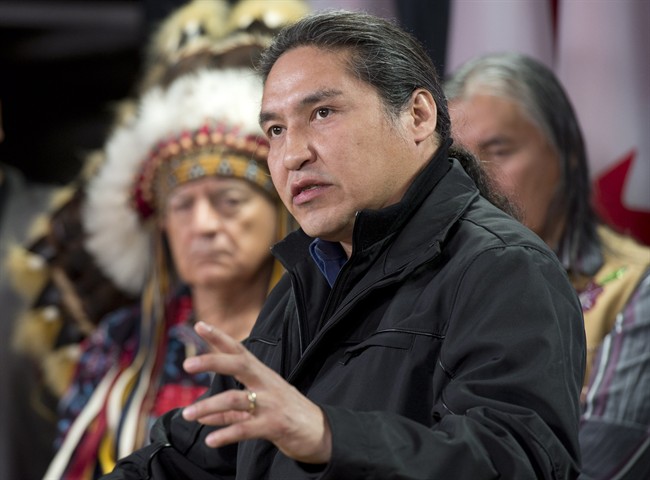EDMONTON – An Alberta aboriginal band has asked a judge to overturn the approval of a $3-billion pipeline project because the provincial government ruled the First Nation didn’t have the right to be consulted about it.

In court documents filed Thursday, the Athabasca Chipewyan First Nation says Alberta’s aboriginal consultation office violated the band’s constitutional rights when it said the band wasn’t directly affected by TransCanada’s Grand Rapids proposal, even though it crosses land claimed as traditional territory.
“We were shocked to learn that Alberta had decided that we had no right at all to be consulted about this project and that they had advised TransCanada of their decision without even informing us,” Chief Allan Adam said in a statement.
“This shows just how profoundly disrespectful Alberta’s process has become.”
The aboriginal consultation office, intended to make talks between First Nations and industry smoother and more predictable, has instead become a major friction point.
It is vehemently opposed by nearly every band in Alberta. One of Premier Jim Prentice’s first promises on assuming office was to reform it.
Prentice said Thursday that he will review the band’s concerns, but noted that the case must now make its way through the courts.

Get weekly money news
“It is a legal challenge that has been brought into court and will have to be resolved in the courts relative to the decisions that have been made before I became premier,” Prentice said from Houston.
He said many aboriginal leaders in the province share Adam’s concerns about the consultation process in general.
Prentice met with Adam in November. He said he looks forward to speaking with the chief again on how consultations can be improved.
“That is something the chief and I can continue to discuss,” said Prentice, who serves as Alberta’s aboriginal affairs minister in addition to his duties as premier.
“Some of the concerns he has are reflected in concerns I have heard from other chiefs as well about how the process works.”
The Grand Rapids pipeline is designed to ship up to 900,000 barrels of diluted bitumen per day from near Fort McMurray, Alta., to the Edmonton area. It is a 50-50 partnership between TransCanada (TSX:TRP) and a unit of PetroChina.
The consultation office is responsible for deciding what level of talks are appropriate when industrial development affects aboriginals. In this case, the office ruled the pipeline wouldn’t affect the ability of band members to practise their treaty rights — even though several had filed affidavits saying they regularly do so on land the line would cross.
The office later told the band that its decision was made on the basis of maps compiled internally — without input from the First Nation. Those maps were not shared with the band.
Meanwhile, the province’s energy regulator began public hearings on the project. The band was granted standing to appear, citing concerns about forest fragmentation, fish habitat, caribou impacts, traditionally used plants and spill cleanup plans.
The band later withdrew from those hearings after the panel refused to give the band an 18-month adjournment to consider project revisions or grant it funding to research responses to TransCanada.
Landowners along the proposed route also suggested the process was biased in favour of industry.
The Grand Rapids hearing was the first held by the Alberta Energy Regulator since it replaced the Energy Resources Conservation Board in 2013 and took over duties from the province’s Environment Department.
Adam has said the new regime seriously undermines efforts to address concerns about First Nations impacts.
Jessica Johnson of Alberta Aboriginal Affairs said the government has suspended part of the consultation office program — a levy on industry that would be used to fund aboriginal consultation and hearing participation.
“The levy is on hold and the aboriginal consultation office will continue working with First Nations as we carry out our annual review of the policy to enable them to participate more meaningfully in the consultation process.”
She said the department wouldn’t comment on the court filing.






Comments